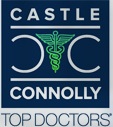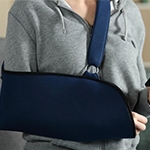
Did you know that you have 206 bones in your body? Bones make up the skeletal system, which gives the body structure, much like the wood and bricks of your home. Structural damage, whether to your home or to your bones, is a serious condition.
Healthy bones are extremely strong and can withstand powerful impacts, but as we know, bones can break. A bone fracture is a full or partial break in the continuity of bone tissue. A fracture is usually the result of a high force impact or stress such as a fall, car accident, or sports injury.
However, as we age, our bones do become weaker, which increases the risk of fracture. Certain health conditions can also weaken bones and increase the risk of fracture. For example, osteoporosis causes at least one million fractures each year.
The symptoms of a fractured bone will vary in severity depending on which bone is broken, but there are common symptoms to watch for if you suspect a bone fracture. These include:
- Severe pain
- Swelling
- Bruising
- Difficulty using the limb
- Abnormal bend, twist, or bump in the limb
If you have broken a bone or suspect a possible fracture, you should immediately seek treatment from an orthopedic specialist. A fracture is usually diagnosed based on a thorough physical examination and imaging studies such as X-rays and CT scans. Timely treatment helps avoid complications such as infection or improper healing. If a fracture is left untreated, permanent deformity of the limb could occur.
A broken bone will usually heal without surgery in 6-8 weeks, but does require stability, blood supply, and adequate nutrients. Treatment for a fracture will depend on the type of fracture. Non-surgical treatments include immobilization of the broken bone, i.e. a cast or sling, and pain medication. In some cases, surgery may be required.
If you have experienced a fracture, it is a serious condition and you should seek for an orthopedic specialist quickly to help avoid complications. Your bones give your body its structure, and we want to help keep your structure sound.
Dr. Yaser A. Metwally is board-certified by both the American Board of Orthopedic Surgery and the Royal College of Surgeons of Canada. He received his fellowship of Reconstructive Surgery from the Mayo Clinic in Rochester, Minnesota and specializes in hip and knee replacement surgery.




 Book an Appointment
Book an Appointment
 Patient Portal
Patient Portal
